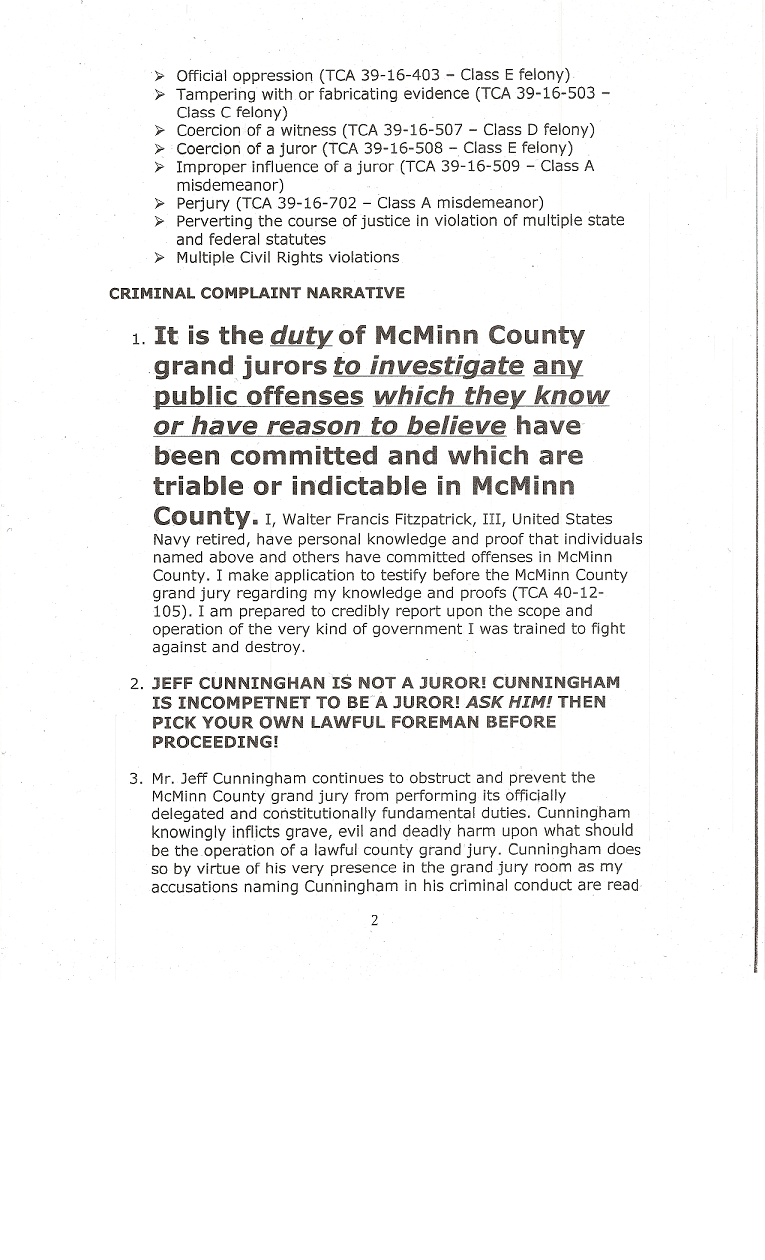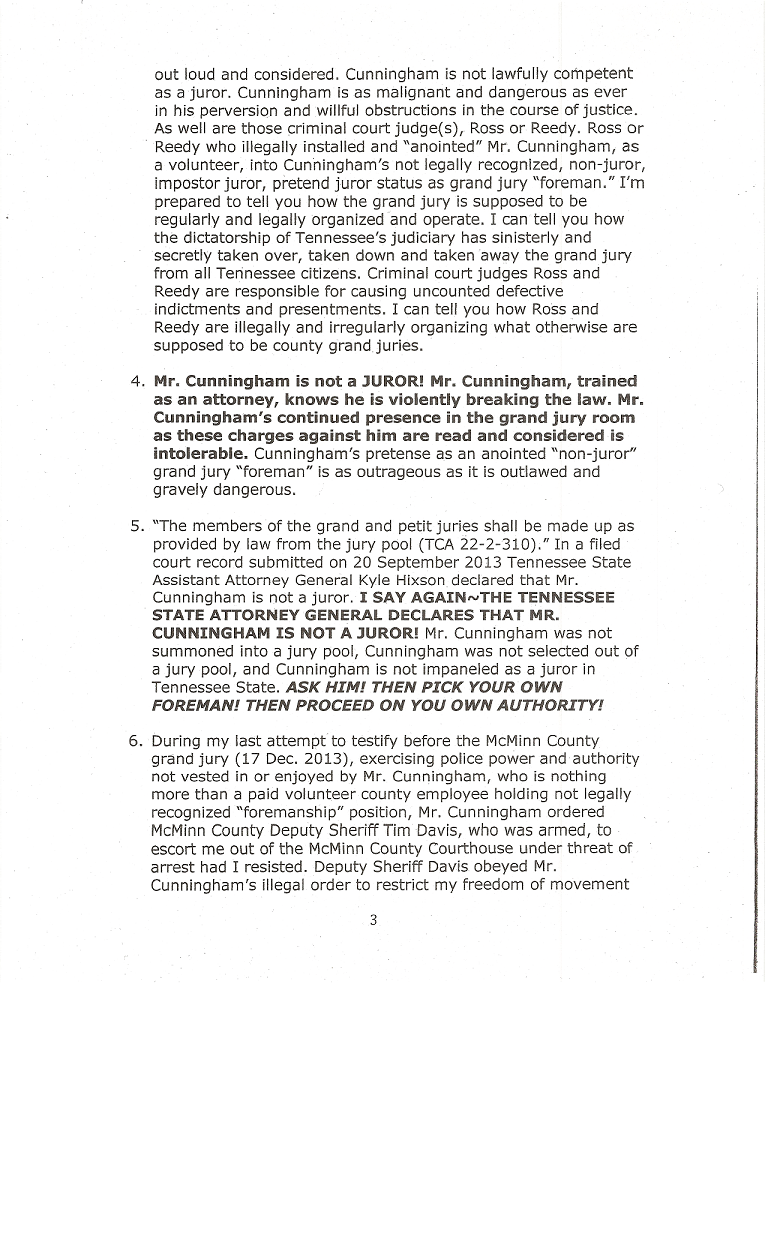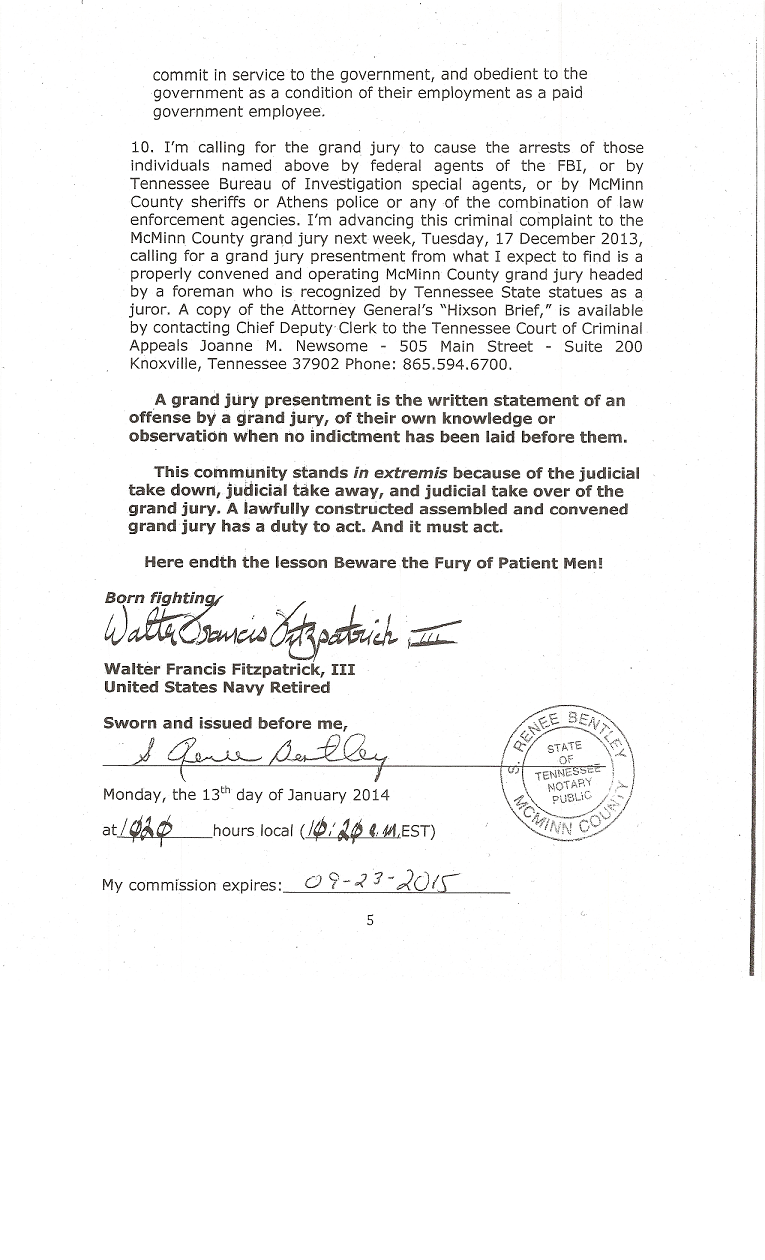GRAND JURORS PROHIBITED FROM SEEING COMPLAINTS OF JURY-RIGGING, ILLEGALLY-INSTALLED FOREMEN AND UNDUE “COMMAND” INFLUENCE
by Sharon Rondeau

(Jan. 23, 2014) — On Tuesday, January 21, 2014, CDR Walter Francis Fitzpatrick, III (Ret.) went to the McMinn County, TN courthouse to report allegations of crime on the part of local judges to the newly-empaneled grand jury.
The Fifth Amendment to the Bill of Rights states that “No person shall be held to answer for a capital, or otherwise infamous crime, unless on a presentment or indictment of a Grand Jury…”
In late 2009, Fitzpatrick discovered that the Monroe County, TN grand jury foreman, Gary Pettway, had served in the position for at least 20 years, and later, that his years as foreman totaled 28. After having contacted local law enforcement, the Tennessee Bureau of Investigation (TBI) and FBI about Pettway to no avail, Fitzpatrick attempted to conduct a citizen’s arrest of Pettway on April 1, 2010. Judge Carroll Lee Ross then ordered that Fitzpatrick be arrested. Fitzpatrick spent five days in jail, refusing food and water in protest.
Fitzpatrick later was told by Monroe County Chief Court Clerk Martha M. Cook that there were no appointing orders or evidence that Pettway had ever been sworn in during his 28 years of “service.”
Upon conducting further research, Fitzpatrick and, by extension, readers of The Post & Email, learned that juries are routinely “rigged” in eastern Tennessee and that grand jury foremen often serve for decades at the pleasure of a judge.
In September 2013, Tennessee Deputy Attorney General of the Criminal Justice Division wrote in a court brief that grand jury foremen are not jurors and are not selected in the same manner set forth in Tennessee Code for jurors, which mandates that all jury members be chosen by “random, automated means.” The law also requires that at least 24 months elapse between terms of service. However, when convenient, criminal court indictments have referred to the foreman as “a juror,” including in an indictment dated June 3, 2010 against Fitzpatrick for the citizen’s arrest. 3 JUNE 10 PRES
Last year, it was discovered that the grand jury foreman in Davidson County was a convicted felon in violation of Tennessee Code, resulting in nearly 900 cases having to undergo re-examinination by an appeals court.
Fitzpatrick and others have observed that the “criminal justice” system in the Tenth Judicial District comprising Polk, Bradley, McMinn and Monroe Counties is a money-making operation for the judges, court clerks, and sheriffs’ departments as citizens are incarcerated without due process or even adequate evidence. The state of Tennessee reimburses local sheriffs’ departments for each day that a person is incarcerated in the county jail, the conditions of which have been described as “absolutely horrendous.”
The Tennessee District Attorneys’ General Conference describes a grand jury and its purpose as:
…a group of thirteen citizens chosen from the jury panel. One of these thirteen is the fore person and will preside over the grand jury. The grand jury hears testimony from witnesses in a private session. Neither the defendant nor his lawyer will be present at the grand jury hearing. A representative of the district attorney general’s office may be present when witnesses present their testimony, but the grand jury’s voting must be done in secret. If twelve of the thirteen grand jurors believe a crime was committed by the defendant, they will charge or ” indict” the defendant for that crime. The formal charge by the grand jury is called an INDICTMENT. Sometimes this charge is also referred to as a “true bill”. When the grand jury refuses to indict someone, its action is sometimes referred to as a “no true bill.” When the Grand Jury returns a “no true bill’ against a defendant, then that person cannot be brought to trial.
Rule 6(g) of the Rules of Criminal Procedure for Tennessee courts states that the grand jury foreman is chosen by the judge and votes with the grand jury. Tennessee law makes no special provisions for the position of “foreman,” and the Rules maintain that the foreman must “possess all the qualifications of a juror.” As stated by the District Attorneys General Conference, the foreman was intended to be appointed from among the 13 jurors, but judges in Tennessee have been allowed to bring in their own foreman “from anywhere they choose,” with an unknown or nonexistent vetting process.
Among other duties, Rule 6e states that grand juror are required to:
…(6) inquire into any state or local officers’ abuse of office; and
(7) report the results of its actions to the court.
In the case of McMinn County, evidence submitted by Fitzpatrick, including Hixson’s brief, has been rejected on several occasions, the latest of which was Tuesday, by grand jury foreman Jeff Cunningham, who is an attorney and bank executive. The judge who appointed Cunningham, Amy Armstrong Reedy, has been quoted as having said that her goal while in office is to see “one million man-years” of incarceration served by the citizens she allegedly serves.
Reedy was not elected, but appointed in 2006 by then-Gov. Phil Bredesen, a Democrat, in accordance with a Tennessee law which allows the governor to appoint a Criminal Court judge from a list of candidates in the event of a vacancy. Reedy had previously clerked for Democrat U.S. Sen. James Sasser and is facing her first election this November.
In September, Reedy was photographed reading to Bradley County schoolchildren as part of the “Race to the Top” disbursement of funds from the federal government, which tied the incorporation of its new “Common Core” curriculum to the grant. Several states have now rejected Common Core, and many parents and educators are highly concerned about its approach and content, which reportedly includes inappropriate adult material and behavioral monitoring.
Reedy appointed at least one juror to a temporary foremanship with the knowledge that the juror had served a previous term, in violation of TCA 22-2-314. 3 JUNE 10 PRES Other judges similarly approved the juror’s presence on the jury, in violation of TCA 22-2-314.
Another foreman appointed by Reedy in McMinn County, Joe Riley, was accused of exerting undue influence on at least some of the grand jury members as reported by The Chattanooga Times Free Press in August 2012.
Fitzpatrick and others have concluded that Tennessee grand juries, and likely grand juries in other states, have become “rubber-stamp” bodies which carry out the prosecutor’s wishes in virtually all cases.
The Attorney General of the State of Tennessee has been informed on numerous occasions of the violation of law on the part of criminal court judges and District Attorney General in the Tenth Judicial District but has chosen not to act.
The Post & Email asked Fitzpatrick what he had hoped to accomplish on Tuesday, to which he responded:
One of the reasons I went on Tuesday is that it’s a new group of people. I knew that the grand jury for 2014 was picked in December 2013; I knew Judge Amy Reedy was the person who did that. I knew that Jeff Cunningham would be coming in and facing a brand-new group of people.
In my brief, I said, “This guy ‘Cunningham’ is a fraud. Ask him yourself, and by the way, he can’t be in the room when you consider this information.” Cunningham knew that, too.
I’m going back next week if I can because there will be another group of people; there are two new grand juries for this year.
On December 7, 2011, Fitzpatrick witnessed Reedy hand-pick grand jurors by reviewing slips of paper with names and other personal information on them. State law requires that the names of grand jury finalists be chosen from a closed box in open court. The Post & Email asked Fitzpatrick if he knew of anyone having observed the grand jury selection last month, which he did not.
I watched all 13 of the grand jury members come in. There were 13 people in the room, including Jeff Cunningham. Of the 12 grand jurors, nine of them were women; three were men. One of the men was in his 20s to early 30s. One woman was in her 20s to early 30s. Two men and eight of the women were easily in their 60s. That very much signals a stacked jury. I’m a student of probability and statistics, and when you have three rounds of random selection to come up with ten people out of a group of 12 who are in the same age group, with eight of them women, it’s very, very highly improbable.
Ten of the 12 people are in their 60s. If I look at the demographics for McMinn County, I’m not going to find ten out of 12 people in their 60s by percentage. They’re going to be in the middle. There is something very wrong with the group I saw walk in on Tuesday.
Every time Jeff Cunningham interferes in the way that he does and every time that he presents himself as the grand jury foreman, he commits another crime, so it was another data point, an opportunity for me to add to the charges that he already faces from me. I’ll go back next month, and I’ll add the charge of his obstruction from Tuesday. I’ll keep going back until I can’t go back anymore.
I walked in with the first grand juror, Mr. Cox – I shook hands with him and gave him my business card – at 7:43 a.m. EST. I waited until about 12:30 before I was summoned into the congressman’s office. Actually, I walked in because i knew I was next. I told Steve Morgan, the Assistant District Attorney, that I had a package that needed to be presented to the new grand jury. I said, “Here is the package, and I don’t think Mr. Cunningham should be handling this.” Cunningham came out and intervened. It’s the most powerful part of the day.
Cunningham would not accept my submission, and I was again escorted out of the building by sheriff’s deputies. It was two deputies at the beginning, Corporal King and the chaplain, Tim Davis. King broke off when I got to the hallway, and Davis walked me out of the building.
I protested. I left the building and stood out front and waited for a period of time. Nobody came out and I said, “OK, fine,” and I finally left and crossed the street diagonally to the parking lot and waited there. Then the sheriff’s deputies realized that I was in the same parking lot as the grand jury members, so the sheriff’s department escorted the grand jury members out of the building across the street.
One of the grand jurors, a lady, was parked right next to me. I waited for a period of time with Tim Davis out front. Then I crossed the street diagonally to go to my vehicle, and I went around to the back, opened up the trunk, and then when I opened the trunk, my view was obstructed from seeing the courthouse. I put my backpack away and was rearranging some things with the trunk lid up, then I closed the lid, and I saw a group of people assembled on the courthouse steps diagonally in front of me, maybe 150 feet away. They were going home, then the sheriff’s deputies realized that I was in the parking lot where they were parked. So they held them up from coming across right away. So I said, “OK, fine.”
When I didn’t leave, the sheriff”s deputies walked across the street with the grand jury members, escorting them to their vehicles, and making sure that none of the grand jury people who may have wanted to approach me and ask me a question could do so. If anybody had tried to do that, a sheriff’s deputy would have intervened.
There is no question that the juries are being rigged. They’re being controlled by Jeff Cunningham, who stands at the head of the table; I have that on tape. He brought up coffee and cookies from home. He is the foreman; he is the leader of this group; they’re to do what he tells them. Imagine if what I had written had been read out loud in the congressman’s conference room, the jury room, by this new group of people with Jeff Cunningham standing in the room, reading what I wrote. But Cunningham didn’t accept the package. I was standing next to Steve Morgan, and I said, “He’s breaking the law here.” I turned to the sheriff’s deputies and said, “This is a crime that’s being committed in front of you all.”
Then Morgan got into a debate about why it’s OK for Cunningham to be there. He said, “All these judges that you’ve faced…You’re convicted; who are you? You’ve been denied this question forever; it’s just your interpretation. None of these judges agree with it.” But it’s the law, and they’re breaking it, and if I got this into a grand jury, they would see that and start asking questions. But Cunningham wouldn’t allow the package in.
Fitzpatrick’s submission contained the following:
This is going to break open at some point. I had conversations with other police officers; two of them were from Nashville, driving three hours to get here. One of them was a guy named William Stewart. I have this on tape. The other guy was there as a ride-along. They were special agents from the Inspector General from the Attorney General’s office. You’ll hear it on the recording.
I showed them what the law says. I described how the random selection process works and how you get into the “box of 13,” and how, from that 13, the judge gets to pick the foreman, and how it’s physically impossible and legally outlawed that the judge gets to pick a guy like Jeff Cunningham in 2012, 2013, and in January 2014, who is here today? Jeff Cunningham. It’s against the law.
Guys like Steve Morgan and all the judges he named all know what they’re doing, and they don’t want to get caught. The rig is in. Federal crimes were committed today, but the feds are behind this, too, as much as local law enforcement officials.
A lot of people are going to have to get behind this complaint and raise it up in numbers so that people start paying attention to what I’m telling them.
Jeff Cunningham knew what was on that complaint on Tuesday, and the world never learned of that. That’s why the grand jury members were escorted out of the building. The bottom line is: Imagine if the complaint on Tuesday said that Jeff Cunningham was known to have committed a murder. He wouldn’t accept the package, he wouldn’t let them see the package, he wouldn’t accept my petition; he just sent me away. You don’t have a better example of a grand jury foreman controlling what goes on and blocking it, providing me another report of government corruption. Cunningham, of all people, should have left the room.
There were also no alternates there.
I’m naming Cunningham as a criminal. He didn’t know what I wrote in the report, and he blocked it from getting in. He has a duty to receive every report from a citizen that comes in the doorway. It’s a civil rights violation, the grand jury is being taken over…it’s just more evidence. Jeff Cunningham broke the law yesterday. He should have said, without any second thoughts, “I’m named; I have to go.” He was standing there as I named him as a criminal.
The Post & Email remarked, “He’s acting like a supervisor of sorts,” to which Fitzpatrick responded, “He’s acting as their commanding officer.”





